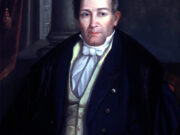Wilson Lumpkin was one of Georgia’s most prominent political leaders of the antebellum period. After early service in local government and the state legislature, he was elected to Congress four times, serving 1815-17 and 1827-31; he resigned before serving his fourth term to run for the governorship of Georgia. Lumpkin was elected governor for two terms (1831-35), then went on to serve as a U.S. commissioner to the Cherokee Indians (1836-37), as a U.S. senator (1837-41), and as a surveyor of Georgia’s boundaries and an advocate of improved transportation, especially as a general manager and key figure in the creation of the state’s Western and Atlantic Railroad. Lumpkin was also a trustee of the University of Georgia in Athens.
All of the public offices were important. In Lumpkin’s eyes, however, his major accomplishment was his cardinal role in the removal of the Cherokee Indians from north Georgia. That effort and his choice of a political career were consistent with his background. Lumpkin was a child of the frontier. He was born in Virginia on January 14, 1783, the second son of Lucy Hopson and John Lumpkin, and his family moved when he was an infant to Wilkes County, to an area that became Oglethorpe County. This part of the state was marked by Indian-white tension and conflict, and Lumpkin recalled vividly in his memoir that his family was “exposed… to frequent depredations from hostile and savage Indian neighbors.” Thus, he encountered the idea that the two cultures could not live together peacefully. His younger brother, supreme court justice Joseph Henry Lumpkin, was born in 1799.

His background also taught him the intertwined worlds of law and politics that would become his entree into power. His father, in addition to engaging in business and farming, was a public figure, serving as justice of the peace, judge of the inferior court, and clerk of the superior court, the major Georgia trial court. Lumpkin acquired his political and legal education from working in his father’s office, from the common schools, and from reading the classic books in his father’s library by such writers as Adam Smith, Plutarch, Edward Gibbon, and David Hume.
Upon attaining adulthood, Lumpkin married, farmed, continued to assist his father, and taught school in the community. In 1804 he was elected to the state legislature, and his lifelong political career began. Lumpkin described himself as a Democratic-Republican and a moderate. Thus, he generally supported states’ rights against what he called federal “consolidation.” He regretted his congressional votes in 1816 for some nationalistic measures, but he was also a staunch opponent of nullification and was important in Georgia’s refusal to join South Carolina in its defiance of the federal Tariff Act of 1828. Within these parameters of political moderation, Lumpkin was a hard-working public administrator, thorough in his preparation and documentation of the various and diverse issues that confronted him in government service, whether these were voting on state or federal statutes, administration of the state penitentiary, improvements in the state’s transportation system, the removal of the Cherokees, or other duties.
Lumpkin’s advocacy of removal was based on clear but harsh views of Indian-white relationships. First, based on his childhood and adult observations, he was convinced that Indians and whites could not peacefully coexist, for the whites would take advantage of the Indians. He was, however, no believer in innate white superiority, for he argued that the Cherokees, if removed to western territory and given time to develop, would acquire a cultural equality with whites and become a state, admitted to the Union on a par with other states. Thus, he advocated removal and, consistently with his states’ rights views, the application of Georgia laws to the Cherokees in north Georgia. This application of Georgia laws included criminal laws, the distribution of Cherokee lands to white settlers by a lottery, and the imprisonment of northern missionaries who argued against removal. On two occasions, Lumpkin defied the U.S. Supreme Court on these matters.
Lumpkin’s views on removal were opposed by a majority of the Cherokee (led by chief John Ross), by prominent federal legislators, and by various Christian missionary societies, but he had more powerful allies in U.S. presidents Andrew Jackson and Martin Van Buren, Georgia public opinion, and majority U.S. congressional sentiment. Thus, removal triumphed, leading to the Cherokee removals west, the best-known of which was the tragic Trail of Tears (1838-39).
Lumpkin lived until 1870, through Georgia’s secession, which he had advocated, the Civil War (1861-65), and into the Reconstruction period. He was married twice. His first wife was Elizabeth Walker, and they had six surviving children: Lucy, Ann, Pleiades Orion, Wilson, William, and Elizabeth. His second wife was Annis Hopkins, and their children were Samuel, John Calhoun, and Martha. Among his historically important descendants were two of his great-grandsons, David C. Barrow Jr., chancellor of the University of Georgia (1906-25), and Barrow’s older brother, M. Pope Barrow, an attorney who served an unexpired term in the U.S. Senate (1882-83).
The south Georgia city of Lumpkin, Lumpkin County in north Georgia, Lumpkin Street in Athens, and Lumpkin House on the University of Georgia campus in Athens bear his name. He died in Athens on December 28, 1870, during Reconstruction, following the secession he had advocated. His farm in Athens was deeded to the university by his daughter and constitutes a significant portion of the current university campus.








